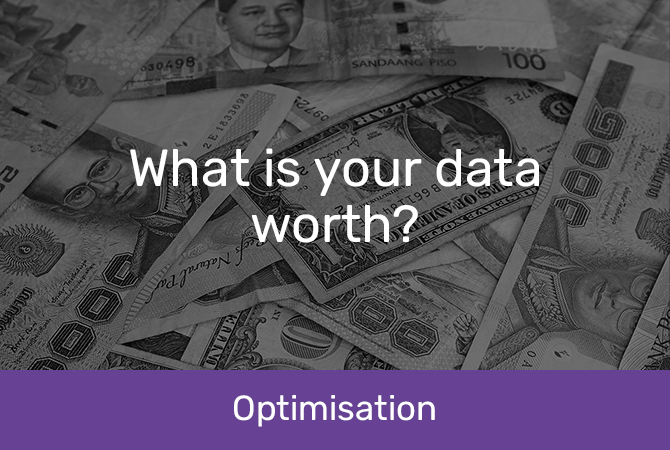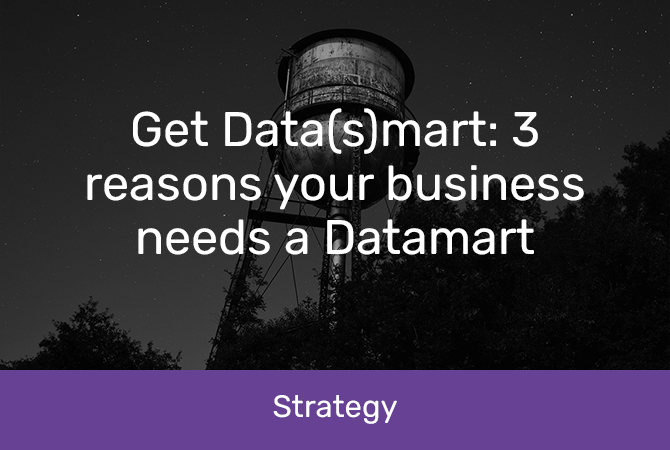
What is your data worth?
Your answer will almost always be “less than it could be”.
There may be a push at your organisation to understand data as an asset — even a desire to put it on the balance sheet! However, while it’s likely everyone feels like data should be important and valuable, it’s unlikely anyone has a clear idea of how that value can be fully maximised. Unlocking the value of your data takes some skill and structure, but by following a well-travelled route you can make solid progress. If you remember these four key things then you can guide your organisation to come up with a responsible answer.
1. The value of your data depends on the skills of your people
The value of your data is directly related to the skills of the people that have access to it and the rigor of the process they use to do analytics.
In the hands of “Steve”, your data might be worth nothing, or even actively hurting you - for example, if he is butchering his analysis and giving everyone bad information. Maybe Steve is accelerating your pain right now by automating and scaling his analytics in your business processes?
On the other hand, “Mary” is making your data sing and giving everyone actionable insights. She is also automating smart decisions that are adding incremental value every time they’re used, but probably only a few people know it.
Problems are amplified when organisations give analytical tasks to a single person rather than a team. If a single person is given an analytics project, there will inevitably be parts of the job they are not as skilled in or where they’ll be required to make assumptions. As a result, you get a sub-optimal and potentially harmful outcome. It's always better to have a proper planning process where teams with varied domain expertise and skills can design the solution to the problem – and then the technical people can go do the right work.
 2. Data quality and availability are paramount to analytics
2. Data quality and availability are paramount to analytics
Once your data is of good quality and availability, the value of it is multiplied. You’ve likely been frustrated with the pace of analytics in the past and been given a laundry list of reasons why it’s hard. Almost all delays and difficulties can be traced back to poor data quality, availability or structure. Data that is properly prepared can hugely accelerate the quality and speed of analysis, leading to increased confidence and use of analytics – a virtuous circle. Preparation means connecting disparate sets of useful data together in a central place and intentionally structuring them for analysis rather than operational use. Note the lack of a “Big Data” shout-out here – the vast majority of value for most organisations is in the relatively small data of their operations and customer behaviour.
3. Find great use cases before doing analytics
Your organisational ability to identify great use cases for data analytics comes before building capability. Almost all the organisations that build capability and then try to apply it fail, and for good reasons:
- They didn’t understand what capability was going to deliver the most valuable results – it turns out they critically needed a screwdriver but ended up getting a bunch of hammers, and now everything looks like a nail
- While they built the team and got to grips with how to add value, the bills were piling up with nothing real to show for it - now the organisation demands results immediately, the best people leave and the team flails around trying to prove they have worth
![]() Instead, get experts to spend time identifying where the value in analytics is likely to be for your unique organisation and then build your team or outsource proof of concepts to gain confidence and value all along the way. Don’t focus on quick wins. Focusing on quick wins leads to a scattered, uncoordinated mix of low value projects that keeps everyone busy but accomplishes very little. It gives people vested in the status quo plenty of ammunition to talk about how doing things differently doesn’t make a difference.
Instead, get experts to spend time identifying where the value in analytics is likely to be for your unique organisation and then build your team or outsource proof of concepts to gain confidence and value all along the way. Don’t focus on quick wins. Focusing on quick wins leads to a scattered, uncoordinated mix of low value projects that keeps everyone busy but accomplishes very little. It gives people vested in the status quo plenty of ammunition to talk about how doing things differently doesn’t make a difference.
Focus instead on wins that provide sustained value, whether small or large. In practice, this might mean over-investing in a small team that is really good at identifying and delivering the best use cases for your organisation, but this multiplies the value of your data and the efforts of your team, so it is worth every cent.
4. External data commercialisation isn't always the answer
The story around data commercialisation is sexy and sounds something like this: data is weightless and costs nothing, but there’s huge value in it and high profit margins for selling it. However, you’re generally much better off focusing first on extracting the value of your own data for you own organisation. For the reasons outlined above plus more (including the need for legal agreements and strenuous governance around sharing data), unless you are sophisticated as a business and making great use of your data already, your data commercialisation outcome is likely to be poor to harmful. Typical outcomes we see when organisations with low internal sophistication do “high margin data sales” deals:
- The internal team can’t deliver the data in a structure or timeframe that’s useful to a buyer
- The buyer is more sophisticated than the seller and captures too much of the value chain
- The seller doesn’t understand the external use cases for their data so they vastly over-inflate their opinion of their data’s worth
However, there are a few data sets that have potential value to a wide variety of other organisations and lend themselves to data commercialisation and monetisation. The main ones are transactional banking data, telco location data, FMCG retail sales data and large-scale loyalty programme data.
Summing Up
To unlock the value of your data, focus on identifying great use cases and building out your data quality and analytics capability from there. Over-invest in experts (internal or external) to help you do this, because it will multiply the value of all your other activities.

















.jpg)







-1.jpg)







































